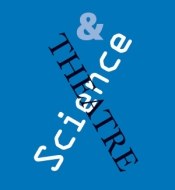Science & Theatre

SCIENCE & THEATRE
FROM THE LAB
TO THE STAGE
TO THE AUDIENCE

Science and Theatre is a transdisciplinary cooperative project at the interface between science and the arts. It combines ethical and social aspects of the natural sciences – as they are presented during young scholars’ studies - with the staging of science plays and science communication in theatre.
Partners in this project are the English Theatre Berlin, represented by its artistic director, Günther Grosser, and Prof. Dr. Regine Hengge from the Institute of Biology at the Humboldt Universität zu Berlin.
Modern science has dramatically changed the world around us and is affecting all our lives in many ways. We hear about global warming, gene therapy, stem-cell research, or nanotechnology every day. Moreover, we begin to realize that beyond dealing with intriguing discoveries and technical problems scientific progress has social and ethical implications that should be addressed by our entire society. In contemporary theatre this is reflected by an increasing number of ‘science plays‘. Originally inspired by the desastrous consequences of the atomic bomb developed by physicists, these plays now increasingly focus on issues related to modern biomedicine. What are the social and ethical consequences of current scientific research? Are scientists responsible for these? How does public policy influence science, and vice-versa? What really happens behind the doors of research labs with scientists driven as much by lust for knowledge as for the Nobel Prize?
Since 2010 the English Theatre Berlin has presented productions dealing with the topic of Science and Theatre. In preparing these, the director, the actors, and stage designers, for whom scientific aspects are rather new, cooperate with scientists and advanced science students who step out of the lab to explore potential social and ethical aspects of their work and for whom the stage is an equally new medium for science communication. In a seminar which constitutes the first phase of each round of the project, Master’s and doctoral students in the Biology Institute are introduced to ethical and social aspects of science. The theatre makers may also participate in these seminars. In the second phase, scientists and students work along with the director, the actors, and the stage designers in preparing the actual plays; they research the scientific background of the scripts and share their experiences and skills with the theatre people. The final phase is the performance, part of the official repertoire of the English Theatre Berlin, as a new means of science communication via the medium of theatre.
A framework of films, readings, lectures and discussions with reknowned scientists, members of the arts community and politicians supplements the plays.